沪教版七年级英语下册总结
完整版本沪教版本初中七年级的英语下册的总结计划精选材料

沪教版英语七年级(下)知识点总结
7
沪教版英语七年级(下)知识
9
沪教版英语七年级(下)知识点总结
01.
沪教版英语七年级(下)知识点总结
11.
沪教版英语七年级(下)知识点总结
Unit 7 poems
21.
沪教版英语七年级(下)知识点总结
31.
沪教版英语七年级(下)知识点总结
Ⅱ.语法when指引的时间状语从句。一、
41.
沪教版英语七年级(下)知识点总结
51.
适用文档
Unit 1People around us
Ⅰ.短语(词组)
文案大全.
沪教版英语七年级(下)知识点总结
2
知识点总结沪教版英语七年级(下)
16.
3
沪教版英语七年级(下)知识点总结
Unit 3 our animals friends
&词组短语Ⅰ.
4
沪教版英语七年级(下)知识点总结
5
沪教版英语七年级(下)知识点总结
完整word版沪教版七年级英语下册总结

Unit 1 People around us
Ⅰ.短语(词组)
1
沪教版英语七年级(下)知识点总结
2
知识点总结沪教版英语七年级(下)
16.
3
沪教版英语七年级(下)知识点总结
Unit 3 our animals friends &词组短语Ⅰ.
4
沪教版英语七年级(下)知识点总结
5
沪教版英语七年级(下)知识点总结
6
沪教版英语七年级(下)知识点总结
7
沪教版英语七年级(下)知识点总结
8
沪教版英语七年级(下)知识点总结
9
沪教版英语七年级(下)知识点总结
01.
沪教版英语七年级(下)知识点总结
11.
沪教版英语七年级(下)知识点总结
Unit 7 poems
21.
沪教版英语七年级(下)知识点总结
31.
沪教版英语七年级(下)知识点总结
Ⅱ.语法when 引导的时间状语从句。
一、
41.
沪教版英语七年级(下)知识点总结
51.。
七年级下沪教版英语知识点

七年级下沪教版英语知识点七年级下学期的英语学习是很重要的一段时间,因为学生在这一学期将会学习很多新的知识点。
在沪教版的英语课程中,这些知识点被分为不同的模块,包括语音、词汇、语法和阅读。
下面将会介绍每一个模块的主要知识点,以帮助学生更好地掌握英语知识。
一、语音语音是英语学习的基础,因此在七年级下英语学习中也是不可少的一部分。
以下是主要的语音知识点:1.元音字母的发音,例如"a"、"e"、"i"、"o"、"u"和“y”等。
2.辅音字母的发音,包括浊音和清音。
浊音包括"b"、"d"、"g"、"v"、"z"、"j"和"w"等,清音包括"p"、"t"、"k"、"f"、"s"、"h"和"q"等。
3.辅音字母组合的发音,例如"sh"、"th"、"ch"、"ng"、"wh"和"qu"等。
二、词汇词汇是英语学习中的重要组成部分,因为它能帮助学生更好地理解和表达英语语言。
以下是主要的词汇知识点:1.单词的拼写和发音,例如颜色、动物、食物、服装和家庭成员等。
2.常见的短语和表达方式,例如问候语、感谢和道歉等。
3.基本的数字和时间表达,例如年份、月份、星期和时刻等。
三、语法语法是英语学习中的重要组成部分,因为它能帮助学生更好地理解和表达英语语言。
以下是主要的语法知识点:1.基本的句型和语法结构,例如陈述句、疑问句、否定句等。
2.名词和代词的用法,例如单数和复数形式、所有格、主格和宾格等。
沪教版英语七年级下册知识点归纳
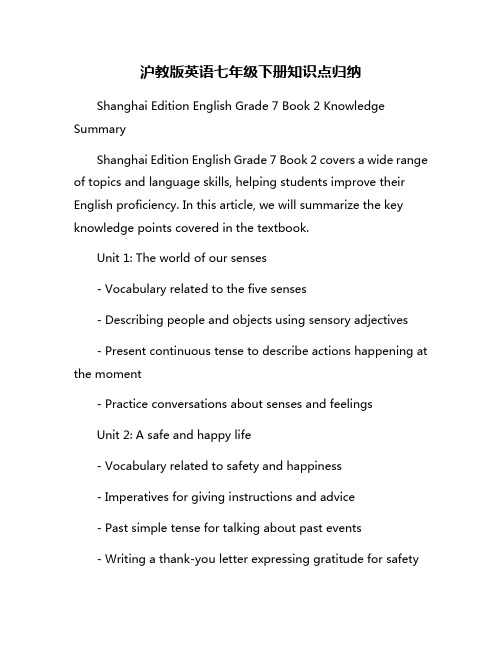
沪教版英语七年级下册知识点归纳Shanghai Edition English Grade 7 Book 2 Knowledge SummaryShanghai Edition English Grade 7 Book 2 covers a wide range of topics and language skills, helping students improve their English proficiency. In this article, we will summarize the key knowledge points covered in the textbook.Unit 1: The world of our senses- Vocabulary related to the five senses- Describing people and objects using sensory adjectives- Present continuous tense to describe actions happening at the moment- Practice conversations about senses and feelingsUnit 2: A safe and happy life- Vocabulary related to safety and happiness- Imperatives for giving instructions and advice- Past simple tense for talking about past events- Writing a thank-you letter expressing gratitude for safetyUnit 3: Getting around- Vocabulary related to traveling and transportation- Asking for and giving directions using prepositions and landmarks- Present simple tense for talking about habits and routines- Role-playing conversations at the travel agency and on the streetUnit 4: Growing up- Vocabulary related to growing up and milestones in life- Using comparatives and superlatives to compare people and things- Future simple tense for making predictions and plans- Describing ambitions and future career goalsUnit 5: Sharing the planet- Vocabulary related to environmental issues and conservation- Modal verbs for expressing obligation and possibility- Present perfect tense for talking about experiences and actions connected to the present- Group discussions on environmental topics and solutionsUnit 6: At work- Vocabulary related to jobs and professions- Using conditional sentences to express hypothetical situations- Using phrasal verbs and collocations in job interviews- Writing a CV and cover letter for a job applicationUnit 7: Cultural heritage- Vocabulary related to cultural traditions and customs- Using reported speech to convey information and opinions- Active and passive voice for presenting and discussing cultural practices- Researching and presenting on cultural heritage and preservationUnit 8: Good health- Vocabulary related to health and well-being- Modal verbs for giving advice and suggestions- Present perfect continuous tense for talking about activities that started in the past and continue to the present- Dialogues on healthy lifestyles and routinesUnit 9: Friends and family- Vocabulary related to relationships and emotions- Using indirect questions and polite requests in social situations- Gerunds and infinitives for expressing preferences and intentions- Role-playing family gatherings and friendly conversationsUnit 10: Life in the future- Vocabulary related to technology and innovation- Modal verbs for future predictions and possibilities- Review of verb tenses and sentence structures covered in previous units- Writing a short essay on the future of technology and its impact on societyOverall, Shanghai Edition English Grade 7 Book 2 provides a comprehensive language learning experience, encompassing all four language skills – listening, speaking, reading, and writing. By mastering the key knowledge points summarized in this article, students can enhance their English proficiency and communication abilities.。
沪教版英语七年级下册知识点归纳

沪教版英语七年级下册知识点归纳一、语法知识点。
1. 一般现在时。
- 概念:表示经常发生的动作或存在的状态。
- 结构:- 主语是第三人称单数(he/she/it等)时,动词要用第三人称单数形式(一般在动词原形后加 -s或 -es)。
例如:He likes reading books.- 主语不是第三人称单数时,动词用原形。
例如:I play football every day.- 时间状语:often, usually, always, sometimes, every day/week/month 等。
2. 现在进行时。
- 概念:表示现在正在进行的动作或存在的状态。
- 结构:be动词(am/is/are)+动词的 -ing形式。
例如:She is singing a song.- 时间状语:now, at the moment等。
- 动词 -ing形式的构成:- 一般在动词原形后加 -ing,如:play - playing。
- 以不发音的e结尾的动词,去掉e再加 -ing,如:write - writing。
- 以重读闭音节结尾且末尾只有一个辅音字母的动词,双写这个辅音字母再加 -ing,如:run - running。
3. 形容词的比较级和最高级。
- 比较级:- 构成:- 一般在形容词原级后加 -er,如:tall - taller。
- 以e结尾的形容词,加 -r,如:nice - nicer。
- 以重读闭音节结尾且末尾只有一个辅音字母的形容词,双写这个辅音字母再加-er,如:big - bigger。
- 多音节形容词和部分双音节形容词,在原级前加more,如:beautiful - more beautiful。
- 用法:用于两者之间的比较,常用结构为“A+be+比较级+than + B”,例如:This book is more interesting than that one.- 最高级:- 构成:- 一般在形容词原级后加 -est,如:tall - tallest。
(word完整版)牛津沪教版英语七年级下期末重点知识复习总结,推荐文档
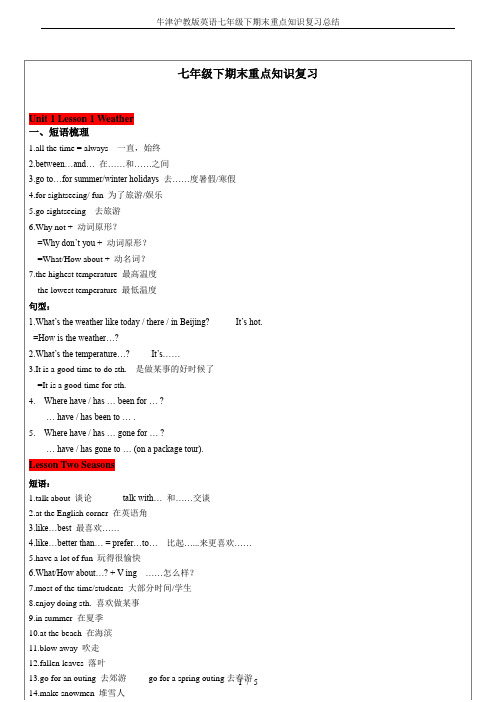
a(one) third 或one-third三分之一three-fifths五分之三a(one) half二分之一a(one) quarter或one-fourth四分之一three quarters或three-fourths四分之三回答型阅读解题技巧一、专题知识梳理知识点1:回答问题的题型、考点和分值1. 题型:一般疑问句,选择疑问句,反义疑问句,特殊疑问句,主观题2. 考点:对各种疑问句的回答方式及语法的考查(如:时态,主谓一致等)1)一般疑问句的回答:yes or no来回答2)选择疑问句的回答:选择其中的一个或者neither或者both来回答3)反义疑问句的回答:根据事实来回答4)特殊疑问句的回答:why—because/because of, how—by/through doing, how long—for+时间段/since+时间点, when和where提问,介词不能够少,how many或者how far提问时,注意限定词only/more than/ at least/about等5)主观题,注意不能用I think it is interesting或者I think it is good来回答,一定要发表自己的观点和原因。
3. 分值:共12分知识点2:回答问题的技巧1.细节题细节题目比较简单,一般从文中可以直接找到答案,直接抄下来就可以2.归纳总结归纳总结类的题目相对较难,基础好的学生还可以,基础较薄弱的学生一般会抄原文或者自己总结的,但是会出现各种各样的错误二、专题精讲D. Answer the question. (根据短文内容,回答下面问题,12分)It's March, 2050.Frank and Mary Smith wake up in their comfortable house in the morning and switch on the bedroom computer to get the latest news. They used to read the Times, but changed to electronic newspapers many years ago.There is the usual news about space: another space flight has returned from Mars and scientistshave discovered a new planet. Then they turn to business news: the US dollar has risen greatly inShanghai, one of the world's leading business centers. Mary tells the computer to buy 5,000 dollars, andthere is a quick response that it has been done.As they watch the screen, Mary orders one of the household robots to make coffee for them.Frank disappears into the study to join a video conference with his partners aroundthe world. He is a computer engineer, working for several companies. This is histhird job: he used to be in marketing and then television.Mary has a quick look at the shopping channels - the usual selection of electric cars, household robots and cheap travel offers - before picking up the video phone to talk to her assistant. She also hasa job and she is doing medical research. Both she and Frank used to have an office desk in London, butin 2014 they decided to move to the seaside and work from home.Frank and Mary have one daughter, Louise, who also has her own workstation at home. She goes to school only one day a week, mainly to play with other students. Classrooms disappeared in 2030 because there was no longer any need for them: communications systems have made it much easier to learn at home.Louise, now thirteen, is studying Chinese at present, which has become a world language as important as English. Louise has many Chinese friends. They communicate by computer.According to the family doctor, Louise will live to at least 130. Her wish is to work for a few decades (十年) and then spend her time on music and painting.3. Many people didn’t believe Sir Francis Bacon, did they?______________________________________________________.4.Who proved that Sir Francis Bacon was right?_______________________________________________________.5.What do you think of Sir Francis Bacon?______________________________________________________________.(2)Library Rules for TeenagersWe want you to remember these rules for our city libraries.◆Always remember to take your library card with you when you visit the library. If you don’thave your library card, we won’t let you in.◆Your library card is for your use only. If you lend it to others, you will still be responsiblefor (对……负责任) the books on the card.◆If you lose your library card, you can get a new one for free with your ID card.◆Take good care of what you borrow. If you lose it, you will have to pay for it.◆You can keep the books for up to 31 days. Remember to return the books on time.◆Tell us your e-mail address and we will remind (提醒) you when you need to return the books.◆If what you want to borrow has been borrowed by others, you can send us an e-mail. We will keep the book for youwhen it is returned. When it is your turn, we will tell you.Read and answer the following questions(阅读短文并回答问题):80. Who are these rules for?_______________________________________81. Can we lend our own library card to others for use?_______________________________________82. What can you do if you lose your library card?_______________________________________83. What will happen if you borrow a book from the library and lose it?_______________________________________84. How long can you keep a book?_______________________________________85. Why does the library need readers’ e-mail address?_______________________________________。
(word完整版)牛津沪教版英语七年级下期末重点知识复习总结,推荐文档.docx
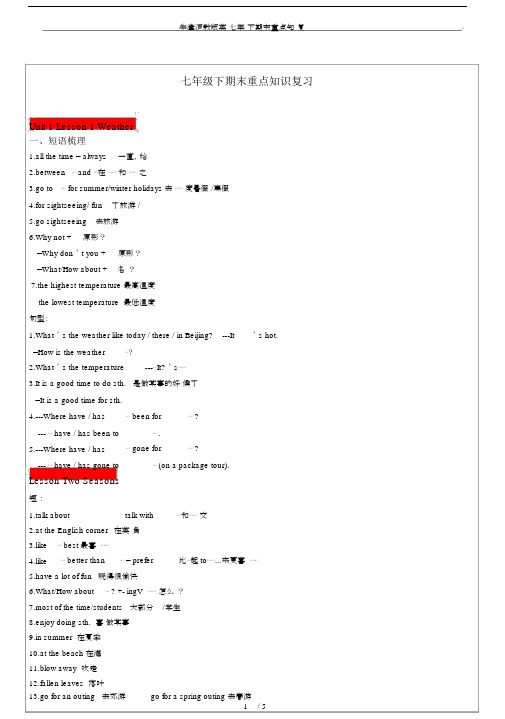
牛津沪教版英七年下期末重点知复七年级下期末重点知识复习Unit 1 Lesson 1 Weather一、短语梳理1.all the time = always一直,始2.between⋯and⋯在⋯⋯ 和⋯⋯ 之3.go to⋯for summer/winter holidays去⋯⋯ 度暑假/寒假4.for sightseeing/ fun了旅游/5.go sightseeing去旅游6.Why not +原形?=Why don ’ t you +原形?=What/How about +名?7.the highest temperature 最高温度the lowest temperature 最低温度句型:1.What ’ s the weather like today / there / in Beijing? ---It’ s hot.=How is the weather⋯?2.What ’ s the temperature---⋯It? ’ s⋯⋯3.It is a good time to do sth. 是做某事的好候了=It is a good time for sth.4.---Where have / has⋯ been for⋯ ?--- ⋯ have / has been to⋯ .5.---Where have / has⋯ gone for⋯ ?--- ⋯ have / has gone to⋯ (on a package tour).Lesson Two Seasons短:1.talk about talk with⋯和⋯⋯交2.at the English corner在英角3.like⋯ best最喜⋯⋯4.like⋯ better than⋯ = prefer比⋯起to⋯⋯...来更喜⋯⋯5.have a lot of fun玩得很愉快6.What/How about⋯ ? +- ingV⋯⋯怎么?7.most of the time/students大部分 /学生8.enjoy doing sth. 喜做某事9.in summer 在夏季10.at the beach 在海11.blow away 吹走12.fallen leaves 落叶14.make snowmen 堆雪人牛津沪教版英七年下期末重点知复法:so 和 neither 引的倒装句1、 So 同,也一So 后面接 be,have, has, do, does, did 或情,然后接主,其的与上文一致,人称与主一致。
沪教版英语七年级下册知识点归纳
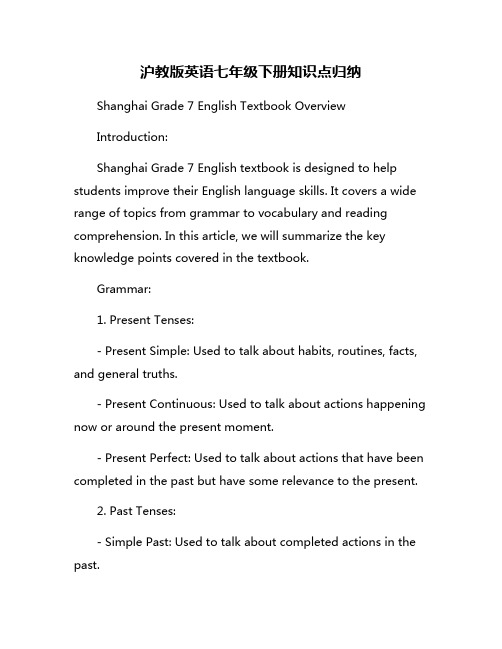
沪教版英语七年级下册知识点归纳Shanghai Grade 7 English Textbook OverviewIntroduction:Shanghai Grade 7 English textbook is designed to help students improve their English language skills. It covers a wide range of topics from grammar to vocabulary and reading comprehension. In this article, we will summarize the key knowledge points covered in the textbook.Grammar:1. Present Tenses:- Present Simple: Used to talk about habits, routines, facts, and general truths.- Present Continuous: Used to talk about actions happening now or around the present moment.- Present Perfect: Used to talk about actions that have been completed in the past but have some relevance to the present.2. Past Tenses:- Simple Past: Used to talk about completed actions in the past.- Past Continuous: Used to talk about actions happening in the past over a period of time.- Past Perfect: Used to talk about actions that were completed before another action in the past.3. Future Tenses:- Going to + Infinitive: Used to talk about plans or intentions in the near future.- Will + Infinitive: Used to talk about future predictions or promises.- Present Continuous for Future Arrangements: Used to talk about scheduled events in the future.Vocabulary:1. Everyday Activities: Vocabulary related to daily routines, chores, leisure activities, and hobbies.2. Jobs and Occupations: Vocabulary related to different professions and workplaces.3. Food and Drink: Vocabulary related to different types of food, drinks, and dining etiquette.4. Travel and Transportation: Vocabulary related to modes of transportation, directions, and travel experiences.5. Environment: Vocabulary related to nature, conservation, pollution, and renewable energy sources.Reading Comprehension:1. Short Stories: Students will read and analyze short stories to improve their reading comprehension skills.2. Informational Texts: Students will read and extract information from informational texts on various topics such as history, culture, and science.3. Dialogues: Students will read and understand dialogues between characters to improve their listening and speaking skills.4. Poems: Students will read and analyze poems to develop their appreciation for literature.Overall, Shanghai Grade 7 English textbook covers a wide range of topics and skills to help students become proficient in the English language. By mastering the grammar rules, expanding their vocabulary, and improving their reading comprehension, students will be well-equipped to communicate effectively in English.。
沪教版七年级英语下册总结材料

---
合用文档
Unit 1People around us Ⅰ . 短语(词组)
文案大全
-----
---
沪教版英语七年级(下)知识点总结
2 -----
---
沪教版英语七年级(下)知识点总结
16.
3 -----
---
沪教版英语七年级(下)知识点总结
Unit 3 our animals friends
Ⅰ. 短语 &词组
4 -----
---
沪教版英语七年级(下)知识点总结
5 -----
---
沪教版英语七年级(下)知识点总结
6 -----
---
沪教版英语七年级(下)知识点总结
7 -----
---
沪教版英语七年级(下)知识点总结
8 -----
---
沪教版英语七年级(下)知识点总结
9 -----
---
沪教版英语七年级(下)知识点总结
10 -----
---
沪教版英语七年级(下)知识点总结
11 -----
---
沪教版英语七年级(下)知识点总结
Unit 7 poems
12 -----
---
沪教版英语七年级(下)知识点总结
13 -----
---
沪教版英语七年级(下)知识点总结
Ⅱ. 语法
一、 when 引导的时间状语从句。
14 -----
---
沪教版英语七年级(下)知识点总结
15 -----。
完整版沪教版七年级英语下册总结材料
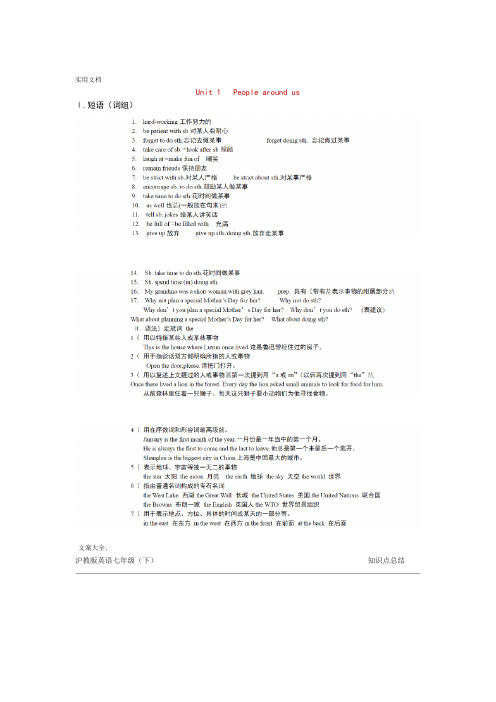
实用文档
Unit 1 People around us
Ⅰ.短语(词组)
文案大全.
沪教版英语七年级(下)知识点总结
2
知识点总结沪教版英语七年级(下)
16.
3
沪教版英语七年级(下)知识点总结
Unit 3 our animals friends
&词组短语Ⅰ.
4
沪教版英语七年级(下)知识点总结
5
沪教版英语七年级(下)知识点总结
6
沪教版英语七年级(下)知识点总结
7
沪教版英语七年级(下)知识点总结
8
沪教版英语七年级(下)知识点总结
9
沪教版英语七年级(下)知识点总结
01.
沪教版英语七年级(下)知识点总结
11.
沪教版英语七年级(下)知识点总结
Unit 7 poems
21.
沪教版英语七年级(下)知识点总结
31.
沪教版英语七年级(下)知识点总结
Ⅱ.语法 when 引导的时间状语从句。
一、
41.
沪教版英语七年级(下)知识点总结
51.。
沪教版七年级英语下册总结

Unit 1 People around us Ⅰ. 短语(词组)4(用在序数词和形容词最高级前。
JanUaIy is the first month Of the year.—月份是一年当中的第一个月□He is always the first to COme and the IaSt to leave.他总是第一个来最后一个斋开。
SlImIgIIaI IS tlιe biggest City UI CIlina.上海是中国最大的城市。
5(表示地球、宇宙等独一无二的审物(he SUII 太阳the InOOn 月亮Uieearth 地球Ihesky 天空tlιe World 世界6(指由普通名词构成的专有名词die WeSt Lake 西湖the Great Wail 长城tħc United StateS 美国die LjIited NatiOnS 联合国rheBro∖vns布朗一家the EngIiSh英国人the UTO世界贸易组织7(用于表示地点、方位、具体的时间或某天的一部分等。
ill the east 在东方iιι the vveςt 在西方In the front 在前面at the back 在后面HI the bottom 在底部at tlιe top 在顶部OIltherlght 在右边On the Ieft 在左边S (存海洋、江河、湖泊、山脉I海峡、海湾等地理名词前the PaCifiC OCean 太平洋the HUangIIe RlVer 黄河the TIallShall MOlUItaUIS 天山LLJ脉th亡TalWalI StIaltS 台湾海峽9(在姓氏复数前(表示一家人TIIe BakerS Canle to See IneymSteTday 贝克一家人昨天来看我。
10(和某些形容词连用(使形容词名词化(代表一类人或物the POOr 穷人the nch 富人the SICk 病人the WOXinded 伤员the good 好人tlιe beaυtιftιl 美丽的事物11(用于西洋乐器、发明物J1)plav the PianO 弹钢琴PlaV the ∖ιolιn 拉小提琴•中国乐器名词前不与冠词连用)Play eιħu(二胡)]2)the*ιι {发明物}必须是单数WhO InVentQd tbe telephone12(某些同定的表达法Ln the InOnliIIg 在早上In the afternoon 在下午in tlιe evening 在晩上go to tlιe CUIellIa 去看电影KQ to the theatre 去右戏all the year round 一年到头oil the WaY to 前往..去的路上13( the加单数可数名词可以表示一类人或事物The horse is a IISefill animal.马是一种有用的动物°注意)像这类句子还有如下两种写法AllOrSe LS a USefol animal.HOrSeS are USefIll animals・14.用在世纪或逢十{1990}的复数名词前Ul tlιel8th Centmy 在18 世纪in the 1960s 在20 世纪60 年代15.用于报刊杂志会议条义历史时期朝代的名词前the Xian incident 西安事变Unit 2 TraVelliIIe aιoιuκi tlιe WOI IdI .短语(词组)1 ・ travel around the WOIid 环游世界2.be famous for 因…著'闻名be famous as 作为…•而暑名3.die CaPitId OfFraUCe CIiilla 法国冲国的首都4.PlnCe Of IntereSt 名胜16Unit 3 our animals friends Ⅰ. 短语&词组1.by OneSelf 独白2.Iead sb. to♦,帯领某人3.Iall asleep / go to sleep / go to bed 睡觉4.I' InSOnythat,,很抱軟5.SOIne rime •段时间SOmetinIe 某个时候SOlnetUlIeS 有时候SOme times 丿L次6.With sb.' S help, … ../with the IIeIP Of sb./sth. 在某人的帮助下7.Wake UP S?来8.get down 蹲卜(趴卜9.tire engine 消防乍10.In danger 处于危险之中11.AniYeIn+ 大地点RCaCh+地点Get to+ 地点gefaιτive/IeaCiI home/Ilere there (IIlJ IIOUIeX heres theιe 三个词前不用介词)12.StaltdOUIg sth: JF始一项长朋或者习惯的动作Start to do Sth13.形∙fH ii]∣⅛z⅛Π>不定弋诃(放在不定代诃SOmetllllIg (anything (nothmg(eveπr tlnng IPlIli II.ift法:反身代词&方位介词一、反身代词二方位介诃常用介词 ilk Olk behind. DeXttOX near. OVerX IUKler(1) . in 在卄里面: TlIe PenCil is in the desk.铅笔在课桌里。
最新沪教版七年级英语下册总结
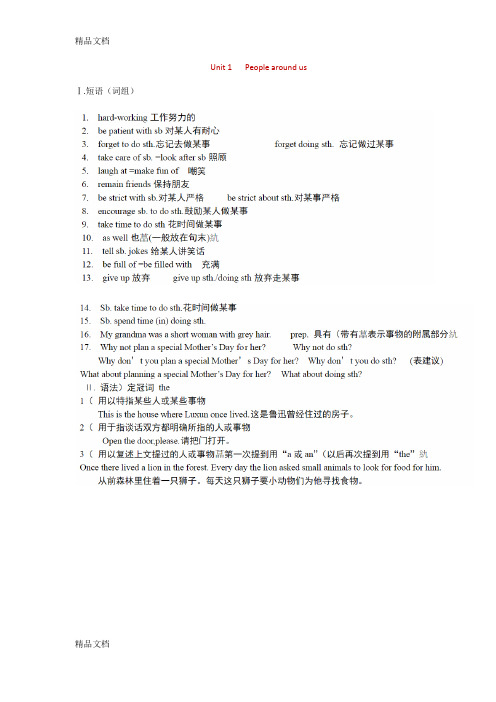
我们熟练的掌握计算机应用,我们可以在网上搜索店提供了多种经营方式。
Ⅱ.语法
一、when 引导的时间状语从句。
调研提纲:Unit 3 our animals friends
Ⅰ.短语&词组
夏日的街头,吊带装、露背装、一步裙、迷你裙五彩缤纷、争妍斗艳。爱美的女孩们不仅在服饰搭配上费尽心机,饰品的选择也十分讲究。可惜在商店里买的项链、手链、手机挂坠等往往样式平淡无奇,还容易出现雷同现象。
加拿大beadworks公司就是根据年轻女性要充分展现自己个性的需求,将世界各地的珠类饰品汇集于“碧芝自制饰品店”内,由消费者自选、自组、自制,这样就能在每个消费者亲手制作、充分发挥她们的艺术想像力的基础上,创作出作品,达到展现个性的效果。
Unit 1 People around us
Ⅰ.短语(词组)
1、DIY手工艺市场状况分析
图1-4大学生购买手工艺制品目的
据了解,百分之八十的饰品店都推出“DIY饰品”来吸引顾客,一方面顺应了年轻一代喜欢与众不同、标新立异的心理;另一方面,自制饰品价格相对较低,可以随时更新换代,也满足了年轻人“喜新厌旧”的需要,因而很受欢迎。
